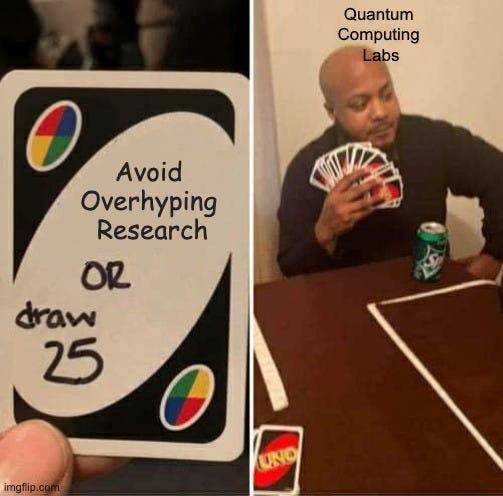Google's 🎉Willow🎉 Breakthrough
Google is still very far from building a practically useful quantum computer. Market moves on the Willow headlines are over done in my view.
GOOG announced Willow, its breakthrough quantum computing chip. Willow is a milestone on a long, winding, and still far-from-practical research journey.
Willow’s key breakthrough is that qubit lifetime increases and error decreases with scale, possibly offering a path to building a practical quantum computer.
I don’t see anything actionable. GOOG’s quantum supremacy demo is old news. Market moves on the GOOG headline hype look premature. But the tech is cool.
Yesterday Google announced Willow, its newest quantum computing chip. This announcement re-inserted quantum computing into market narratives: Google’s stock moved up, Bitcoin dipped from its new highs, and Twitter experts pivoted from talking AI to holding seminars on quantum computing.
I love quantum computing, and I’m excited by Google’s news. So, I’m sorry to be a party pooper, but we don’t have useful quantum computers yet.
I studied quantum computing as part of my undergrad physics degree, and I like to track quantum computing topics. Does that qualify me to critically discuss quantum computing topics in this post?
I’ll let you be the judge.
What’s in Fred’s Rotation
A Very, Very Brief Introduction to Understanding Google’s Quantum Computing Breakthrough
For my market-focused readers, I’m going to provide a very brief and high-level introduction to the quantum computing details that needed to come together for Google to announce Willow before I strongly encourage you to go out and learn a lot more about this topic from more authoritative sources:
Quantum computing is an active field of research seeking to build a new type of computer that unlocks the parallel computing potential of quantum mechanics
No general-purpose quantum computers exist, and almost all quantum computing technology remains strictly a research product
Quantum computers are built using “qubits,” which are analogous to but not the same as a normal computer’s bits
Qubits represent a probability of being either “0” or “1” unlike a normal computer’s bits, which are definitely either “0” or “1” at all times
Quantum properties (probability amplitudes, entanglement) make it theoretically possible to solve computing problems that are too hard for normal computers
It’s really, really, really hard to build qubits since quantum mechanical systems fall apart really quickly and this introduces a lot of error into quantum calculations
Researchers are creatively stacking a bunch of physical qubits together to build “logical qubits,” which theoretically can run error resistant computations
If thousands or millions of logical qubits can be built and integrated, it could become possible to build a useful general-purpose quantum computer
A quantum computer achieves “quantum supremacy” when it can run computations in a reasonable timeframe that would take a normal computer eons
Quantum computers also require new approaches to lower-level software that can handle and interpret the probabilistic nature of quantum computing
In more succinct terms, the machine below running Google’s Willow chip could be dunked into a vat of liquid nitrogen to create one error-corrected logical qubit for ~68μs. 🎉🎉🎉

My favorite author on quantum computing topics, Professor Scott Aaronson, published a great post on Willow today that I encourage you to check out if you want to get a bit deeper into the tech: The Google Willow thing
Professor Aaronson’s Intro to Quantum Information Science lecture notes are a great in-depth starting point for getting a solid foundation in this fascinating field.
“Often abbreviated to just “quantum supremacy,” the term refers to the use of a quantum computer to solve some well-defined set of problems that would take orders of magnitude longer to solve with any currently known algorithms running on existing classical computers—and not for incidental reasons, but for reasons of asymptotic quantum complexity.”
- Professor Scott Aaronson, Scott’s Supreme Quantum Supremacy FAQ!
Google’s Willow Chip is Promising, but they are Far from Building a General Quantum Computer
In my experience, corporate quantum computing research labs are prone to greatly over-hyping the practicality of their breakthroughs. The media is far worse when crudely translating hard tech and quantum topics into pop-sci headlines.
Let me make my party-pooper view clear in this context: Google’s Willow quantum computing chip would need to be scaled up many orders of magnitude before it becomes useful.
I don’t want you to think I am not excited by Google’s update, because I sincerely am excited. Google’s Willow research dump delivered on the three dimensions of quantum computing that I typically focus on:
Physical and logical qubits: These grew to 105 and 1 respectively. Google’s 2019 Sycamore processor had 53 qubits and 0 logical qubits.
Error correction: Willow’s error correction scales predictably with code length
Quantum supremacy: Willow expanded the quantum supremacy demonstrated for a contrived metric that I would describe as a research benchmark
As Google noted, Willow represents a prototype platform for building logical, error corrected qubits that could be scaled up. This is the exciting part! I hope to see substantial progress here. Nevertheless, my base case is that it takes another decade or two before something practical begins to emerge.
Towards that end, here’s the money shot chart from Google’s blog posts that shows Willow achieving predictable improvements to error rates with expanding surface code lengths. The important part is that the 5x5 and 7x7 lattice surface code curves (the blue curves) are below the green curve, which represents the error rate of a purely physical system.

Let me also just say that no, building a quantum computer doesn’t prove that we live in a multiverse. I really commend Google’s corporate comms team for including that little comment in the general press release, it really got the pop-sci press going.
The multi-worlds comment is more of a philosophical topic with roots running back to the 1920’s when quantum mechanics was first being formalized, and of course to Hugh Everett’s famous 1957 doctoral dissertation.
On this topic I’ll just quote Prof. Aaronson again, who wrote today regarding Google’s many worlds interpretation commentary:
“…in my view, the new experiment doesn’t add anything new to this old debate. It’s yet another confirmation of the predictions of quantum mechanics. What those predictions mean for our understanding of reality can continue to argued as it’s been since the 1920s.” - Professor Scott Aaronson
What Happens if Someone Builds a Quantum Computer?
Let’s say someone could build a general purpose quantum computer today. Hooray! What might change in the world (and the markets)?
Here’s my view of the top 3 market-facing areas such a quantum computer would impact today:
Encryption would need to hard pivot to post-quantum cryptography methods as existing encryption methods could be broken by Shor’s algorithm.
Bitcoin and other cryptocurrency private keys could be discovered from their public keys, meaning crypto wallets would be at risk of systematic theft.
Bitcoin mining becomes trivial, so proof of work with existing encryption schemes is cooked.
All communications and secure digital storage systems are vulnerable to attack, meaning banks, telecoms, tech co.’s, etc. using existing encryption schemes are no longer secure
Complex molecules and physical systems could be quickly and accurately modeled using quantum computers
Chemistry and pharmaceutical research could be revolutionized as accurate and fast physical simulations of molecules and molecular interactions become possible
Material science research could be similarly revolutionized as quantum mechanical systems could be accurately and quickly simulated
Search and optimization algorithms could be run much, much faster and with larger data sets on quantum computers
AI/ML systems that make use of computationally complex search and optimization methods could be scaled up further or run more economically
Search-focused companies could see substantially improved margins
Quantitative financial portfolio construction and optimization calculations could be massively scaled up
Infrastructure could be more deeply optimized across e.g. power grids, EV charging optimization, and many other problems
Quantum computers could be monetized by hyperscalers as specialist computation platforms for search and optimization problems
I’m just starting to scratch the surface here, but I think you can also see a theme here: quantum computers are likely to be specialist devices, not general purpose computers.
Yes I think they would be world-changing, revolutionary technology, but I don’t yet see a need for every household to have a quantum computer.




